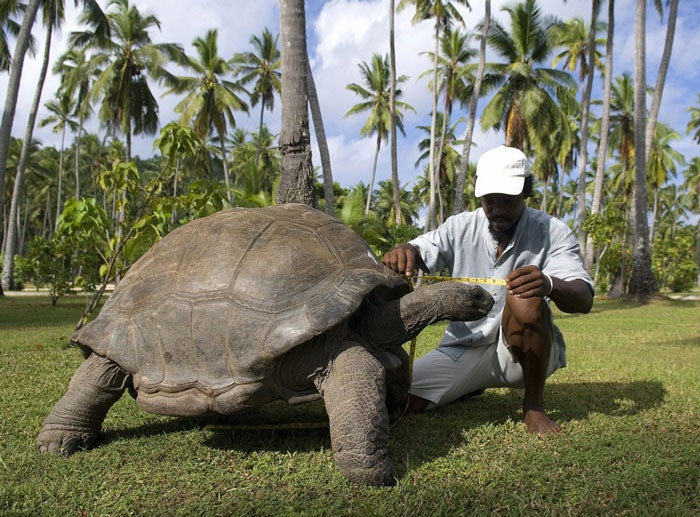To save turtles in the Seychelles, you'll need a gold credit card
Aoife O'Riordain follows a nature trail strictly for the luxury traveller

Your support helps us to tell the story
From reproductive rights to climate change to Big Tech, The Independent is on the ground when the story is developing. Whether it's investigating the financials of Elon Musk's pro-Trump PAC or producing our latest documentary, 'The A Word', which shines a light on the American women fighting for reproductive rights, we know how important it is to parse out the facts from the messaging.
At such a critical moment in US history, we need reporters on the ground. Your donation allows us to keep sending journalists to speak to both sides of the story.
The Independent is trusted by Americans across the entire political spectrum. And unlike many other quality news outlets, we choose not to lock Americans out of our reporting and analysis with paywalls. We believe quality journalism should be available to everyone, paid for by those who can afford it.
Your support makes all the difference.I'd honk the horn if I had one. The road ahead is blocked by a gigantic tortoise – and he isn't going anywhere. His name is Brutus; he weighs just under 200kg and at 150 years of age he's the oldest resident of North Island in the Seychelles.
A short hop by plane from the capital Mahé, North Island is one of the Seychelles' most exclusive retreats selling responsible luxury holidays. At an eye-watering £1,200 a night, this is a nature trail for the rich or once-in-a-lifetime visitor. Yet the work being done on North Island is essential to the preservation of the Seychelles' precious biodiversity. Brutus is one of 30-odd Aldabra giant tortoises living on the island. If all goes according to plan, that number will increase.
The flora and fauna on North Island, one of the 650 million-year-old inner granite islands of the Seychelles, were devastated by the arrival of humans in the late 18th century. The colonists cleared the island of its vegetation in favour of cash crops such as coconut and cinnamon. By the 1970s, it had been abandoned and overrun with cats, rats and mynah birds. The diversity of endemic species across the whole archipelago is relatively limited, but due to its remote location – the closest neighbour is Madagascar, about 1,000km away – several, such as the Aldabra giant tortoise and magpie robin, cannot be found anywhere else on earth.
Now privately owned by South African Wilderness Safaris, North Island has been declared a nature reserve and is running a programme loftily christened the Noah's Ark Project to reintroduce species to the island, partly funded by the tourist initiative in conjunction with support from the Seychelles ministry of the environment and natural resources. Since efforts began about a decade ago, more than 100,000 trees have been planted, and last July a milestone was reached when 25 of the endangered Seychelles white eye birds were released.
The tourism element of this project has been designed to integrate into the natural surroundings. Apart from two stone buildings from the original plantation, the structures have been made from a variety of woods including native Takamaka trees; the look is Swiss Family Robinson meets Architectural Digest. There are 11 sprawling thatched villas for guests, set back from the beach so that the lights don't disorientate the hawksbill and green turtles that lay their eggs on the sand. The focal point, the bar and restaurant, features a spectacular upturned tree, its gnarled root system spreading out to form a canopy.
No luxury is spared. Each villa comes with a butler and has plunge pools, indoor and outdoor showers, air-conditioning, flushing loos and electric golf carts to drive around in – not to mention a wine list that will satisfy those who would think nothing of popping open a bottle of Lafite Rothschild with dinner. And when guests bore of lounging beneath billowing muslin drapes they can take a walk with Greg, the island's ecologist, to see the pens of tiny terrapins and tortoises and plants including one of the six varieties of fig trees favoured by the Seychelles blue pigeon. He will explain how sea temperatures are monitored, fish are studied and turtle breeding patterns are closely recorded.
It's a paradisiacal place for such noble endeavours, with its stretches of white sand framed by coconut trees and strewn with the islands' unearthly giant granite boulders, and some might find the eco-luxury concept an oxymoron too far. But if you fancy sharing your sun-lounger with a skink, then North Island is a very tempting place to melt the credit card.
How to get there
North Island (00 24 82 93 100; north-island.com) offers double rooms from €1,690 (£1,207) per person per night, based on two sharing, on a full-board basis, including all drinks and most activities. Kuoni World Class (01306 747001; kuoni. co.uk/worldclass) can arrange itineraries in the Seychelles including return flights, transfers and a stay on North Island.
Further information
Seychelles Tourism Board (020-7333 0147; seychelles.travel).
Join our commenting forum
Join thought-provoking conversations, follow other Independent readers and see their replies
Comments